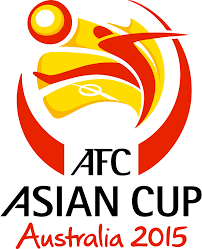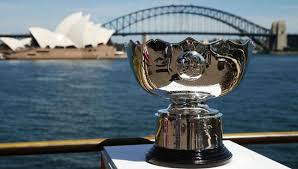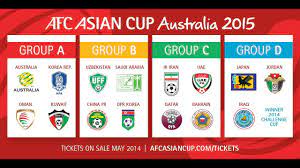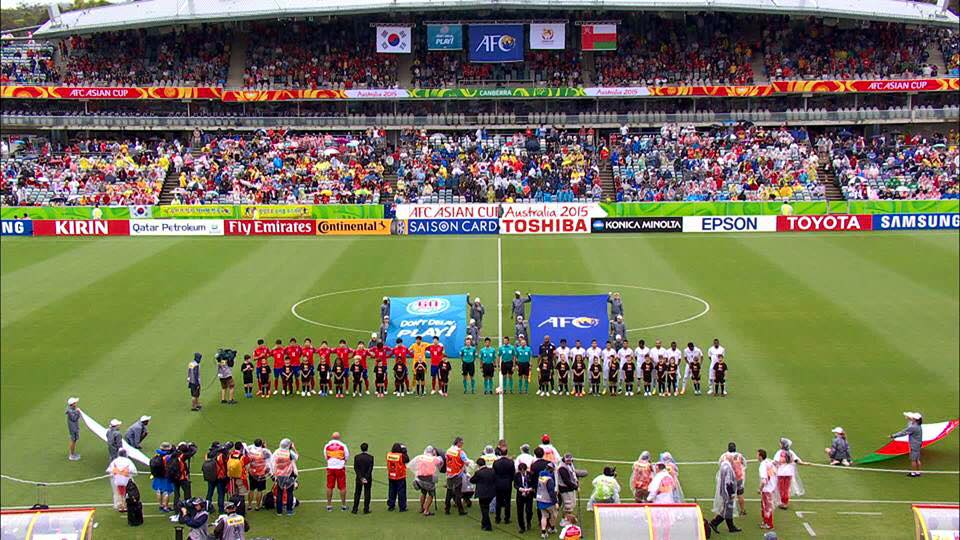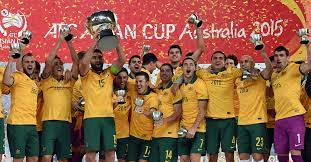The 2015 AFC Asian Cup saw the competition go down under for the first time as Australia stepped up to host the tournament, with Brisbane, Canberra, Melbourne, Newcastle and Sydney all providing venues and Stadium Australia the venue for the final.
2015 Asian Cup
Winner: Australia
Runners-up: South Korea
Third place: UAE
Fourth place: Iraq
Host: Australia
Australia, as well as being hosts, had already qualified as the 2011 AFC Asian Cup runners-up, with Japan and South Korea the other 2011 top three to qualify.
This meant 13 places being available from the qualification competitions, including the winners of the 2012 and 2014 AFC Asian Challenge Cups.
From those tournaments, North Korea secured their place by winning the 2012 Challenge Cup, while Palestine secured their first Asian Cup finals place by winning the 2014 Challenge Cup.
These two competitions gave 24 countries classed as emerging countries valuable tournament experience as the AFC continued the development of the lower ranked nations to improve competitiveness
It also meant that the 20 nations ranked as developed would take part in the main qualification tournament and, with 11 places available, it meant that the best ranked third place team from the group qualifiers would get a berth at the finals.
Group A saw Oman and Jordan go undefeated throughout to qualify for the finals, with Oman topping the group after a 3-1 win against Singapore in the final group game. Jordan, who had the added distraction of a two-legged playoff against Uruguay for a place in the 2014 World Cup, finished two points behind, while Syria and Singapore beat each other, but were never in contention for qualification.
Group B saw Iran make it back to another Asian Cup finals, with a draw with Kuwait the only blot on a perfect qualification campaign that saw 18 goals scored. Kuwait struggled, but a 3-1 win against Thailand proved enough in Kuwait City to get them over the line ahead of a Lebanon team who showed great improvement from previous tournaments, but just missed out on a finals place to both Kuwait and via the best third-placed team.
Group C was the group where the best third-placed team was placed and it was China PR who managed to qualify for the finals through goal difference, although they were very lucky to do so after losing 3-1 to Iraq in the final group game.
This win took Iraq back to the Asian Cup finals in second place, behind a Saudi Arabian team determined to return to the finals and improve on their dismal display in 2011, and who topped the group with 16 points. Indonesia finished bottom of the group, with only a 1-1 draw against China PR to show for their efforts.
Group D saw the neighbouring nations from the Arabian Gulf dominate proceedings and qualify well ahead of an improving Malaysia team and an outmatched Yemen side who lost all six games. Bahrain continued their excellent Asian Cup qualifying record by topping the group undefeated, including a 1-0 win over second placed Qatar. Malaysia won home and away against Yemen and held Bahrain 1-1 in Kuala Lumpur, but just fell short of a return to the finals.
Finally, Group E was won with some ease by the UAE, with 18 goals scored from five wins and a draw against 2011 semi-finalists Uzbekistan in the final group game.
The Uzbeks started slowly, drawing 0-0 with Hong Kong and losing 2-1 to the UAE, before a run of three wins took them to the finals tournament for the sixth time, ahead of Hong Kong, who started brightly, but failed to get another point after beating Vietnam 1-0, and a Vietnamese team who finished on a high after a disappointing campaign with a 3-1 win over Hong Kong in Hanoi.
Australian finals
The land down under greeted the 15 arriving competing nations, with the same draw arrangement as the previous three competitions of four groups of four and the top two qualifying for the quarter-finals
The hosts kicked off the tournament in Melbourne against Kuwait. With anticipation at a high and Australia amongst the favourites, it was then a massive surprise when Hussain Fadhel headed the Kuwaitis ahead after just eight minutes.
That was to be as good as it got for Kuwait and the home supporters were soon celebrating a Tim Cahill equaliser, with Massimo Luongo putting Australia ahead at half-time. Further goals from a Mile Jedinak penalty and a close-range James Troisi goal gave Australia a 4-1 win.
Kuwait were to find no more luck in the other two group games and went home pointless after 1-0 defeats to South Korea and Oman, while Australia put on another four-star performance in a 4-0 win over Oman, but then slipped to a 1-0 defeat in Brisbane against South Korea that won Group A for the Koreans after they had won each group game 1-0.
Group B saw a surprise as Saudi Arabia crashed out in the Group stages for the second successive tournament. They improved on their pointless performance in 2011 after thrashing North Korea 4-1, but lost 1-0 in the opening match against China PR, then collapsed late on against Uzbekistan to lose 3-1.
That win by Uzbekistan secured second place in the group after they had beaten North Korea 1-0 in their opening game, but then lost 2-1 to China PR, having originally led. China PR made it to the quarter-finals for the first time since 2004 and completed their first ever 100% record in the group stages, while North Korea had nothing to show for their efforts and went home pointless.
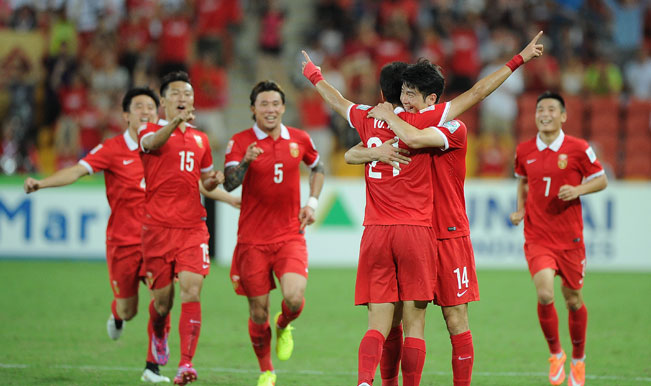
Group C was an entirely Middle-Eastern group, with Iran topping the group with three wins from three and without conceding a goal. They did so after beating the UAE 1-0 in the final group game through a Goochannejhad goal in the last minute, leaving the UAE second in the group after they had earlier beaten Qatar 4-1 and Bahrain 2-1 to assure themselves of a Quarter-finals place.
Bahrain won the battle for third place with a 2-1 win over a Qatar side who had expected more from the tournament after their Quarter-final appearance four years previously, but who left the 2015 finals with no points.
Finally, Group D saw defending champions Japan dominate proceedings, winning all three games and further establishing that any team that wanted to take the Asian Cup from them would have to work very hard to do so.
They were joined in the quarter-finals by Iraq, who started their tournament with a 1-0 win in Brisbane against Jordan, but then lost by the same score to the Japanese and left them needing a win against Palestine to secure their place in the quarter-finals.
They achieved this, but relied on an Ahmed Yasin goal two minutes from time to secure a nervy 2-0 win. It was harsh on Palestine, who had put on a brave display after earlier 4-0 and 5-1 defeats from Japan and Jordan respectively had ended their debut tournament in brutal fashion.
It also saw Jordan go home early despite the 5-1 win over Palestine that saw Hamza Al-Dardour scored four goals, with a 2-0 defeat to Japan putting them out.
The first quarter-final saw South Korea face an opponent other than Iran for the first time in five Asian Cups as they took on Group B runners up Uzbekistan.
South Korea had the better of the chances throughout the game, with Nesterov keeping the Uzbeks in the game with several world-class saves, including a reaction save from a Son Heung-min header. Uzbekistan had a chance to win it with just 12 minutes left, but Turaev’s header went just the wrong side of the post with Kim Jin-hyeon struggling to get over.
The game went to extra-time and finally saw the Uzbek resistance broken when Son Heung-min forced a header between Nesterov and the post to put the Koreans ahead, then he finished the job with a minute left when Cha Du-ri broke down the right-hand side and centred it for Son to power home for 2-0 and a Semi-final spot for South Korea.
The second quarter-final saw China PR play their first game at this stage since 2004 against hosts Australia. It was the Chinese who dominated proceedings early on as Australia struggled to cope with nerves, with Sun Ke and Wu Lei forcing smart saves out of Matt Ryan and Australia fortunate to take the game to half-time scoreless.
However, the hosts regrouped during the half-time break and after coming out stronger as the second half started, they were rewarded with a wonder goal from Tim Cahill, who opened the score with an overhead kick that flew past Wang Dalei and sent the Brisbane stadium in to raptures
Australia dominated the remainder of the game and Cahill finished off the Chinese with a powerful header after 65 minutes, giving Australia a 2-0 win and a semi-final place.
The next quarter-final brought together Arabian arch-rivals in Iran and Iraq and produced one of the most dramatic, entertaining and emotional matches of the whole tournament.
In front of a packed crowd in Canberra, Azmoun scored first with a powerful header for Iran, but the Iranians were then dealt a blow after Mehrdad Pooladi was sent off controversially after a clash with the Iraqi goalkeeper Hasan just before half-time.
Iraq made the additional player difference count when Ahmed Yasin fired home with a low angled drive after an Abdul-Zahra cross caused chaos in the Iranian box to equalise for Iraq.
Both sides had chances to win the game in the 90 minutes, but couldn’t find a way through, leaving the game 1-1 after normal time and necessitate an extra 30 minutes to try and find a winner.
Iraq struck first three minutes into extra-time when Younis Madmoud dived low to get on the end of an Ismail cross that deflected off Haghighi’s leg in the Iranian goal into Mahmoud’s path.
Iran, despite being down to 10 men, were not down and out and found an equaliser when Pouraliganji scored a header from an Iranian corner. The same player was to turn villain just 13 minutes later, however, when his foul on Kasim conceded a penalty that Ismail converted to seemingly put Iraq through.
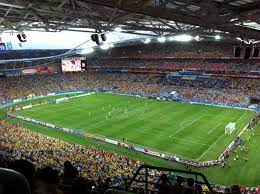
There was to be late drama though, as just minutes later, Ghoochannejhad scored another late tournament goal when heading home from close range after a goalmouth scramble.
This took the game to penalties after a breathless 3-3 draw and provided just as much tension and drama as both teams missed their opening penalties, then the remaining four for each side were converted to take it to sudden death. It was Iran who blinked first as Vahid Amiri hit the post and Salam Shaker converted his penalty to put Iraq through 7-6 on penalties.
After the match, the Iranian Football Federation lodged a formal complaint to FIFA after Iraqi midfielder Alaa Abdul-Zahra tested positive for the banned stimulant methylhexanamine, in results that were verified by a WADA-approved laboratory in Cologne. In an email exchange dated September 2014, FIFA promised to take action but there is no record of a suspension for Abdul-Zahra. The AFC disciplinary committee decided that the protest was unfounded and dismissed the case, sending the devastated Iranians home.
The final quarter-final was no less dramatic as holders Japan took on the United Arab Emirates in their first quarter-final since hosting the tournament in 1996.
The Japanese were fancied to take their place in the semi-finals, but were stunned at Stadium Australia with Ali Mabkhout ran onto an accurate long pass from Abdulrahman and volleyed home with a power drive off the post after just seven minutes.
Honda nearly levelled up for Japan two minutes later, but the Japanese struggled to find clear chances to score as the UAE held on to their lead into half-time. Morishige and Muto had chances to equalise, only to push their shots wide, and it looked like the UAE would hang on for a shock win.
Japan were not through yet, however, and they found an equaliser as Gaku Shibasaki rifled home a brilliant goal from the edge of the penalty box after running on to a subtle pass from Honda.
Kagawa had the chance to win the game in normal time, but somehow contrived to miss from in front of the goal. That took the game to extra time, but neither side could force a way through, meaning that penalties would decide who would face Australia in the Semi-finals.
Japan started disastrously when Honda saw his penalty saved by Naser, but Esmaeel subsequently missed his penalty to level things up. The shootout went to sudden death and saw Kagawa’s penalty hit the inside of the post and bounce away, and the UAE progressed to the Semi-finals for the first time since 1996 when Ismael Ahmed stroked his penalty home for a 5-4 win, putting out the holders at the Quarter-final stage for the first time ever.
The first Semi-final saw South Korea qualify for their first Asian Cup final since 1988 as they put on a professional display to beat the 2007 champions Iraq 2-0.
Lee Jung-hyup opened the scoring after 20 minutes when he got his head to an in-swinging free-kick from Kim Jin-su and South Korea continued to boss the game, leaving Iraq with only a few long-distance efforts to show for their work.
Five minutes after the half-time break, Kim Young-gwon all but made the game safe when he chested down a knock-down pass from Jung-hyup and his left foot volley skidded past Hassan in the Iraqi goal.
Iraq tried their best to get back into the game through efforts from Younis Mahmoud, but it proved in vain as South Korea made it to the final.
They would be joined in the final by hosts Australia, who struck early to give themselves a lead against the UAE that they were never in danger of losing.
Trent Sainsbury scored his first international goal just three minutes in when he headed home from Massimo Luongo’s right wing corner, raising the roof of the Newcastle Stadium from the noisy capacity crowd in attendance.
The UAE threatened an equaliser a few minutes later when Ahmed Khalil hit the foot of the post with a low drive, but their task got much harder on 14 minutes when after Cahill and Leckie were denied by desperate defending, Jason Davidson stroked the ball home for his first international goal as well and a two-goal cushion for the hosts.
The UAE threatened briefly at the beginning of the second half through Abdulrahman and Ahmed Khalil, but Australia held firm and celebrated reaching their second successive final with a fine 2-0 win.
Iraq and the UAE played out an entertaining third-place playoff in Newcastle, with the UAE just edging a five-goal contest as Ali Mabkhout secured the golden boot with his fifth goal of the tournament to win the game 3-2.
The final was set for Stadium Australia and a capacity crowd was in attendance to see a rematch from Group A, where South Korea had beaten Australia. The Koreans had been in three finals previously and were looking for their first final win, having top the round-robin competitions in 1956 and 1960, while Australia were looking to become the first hosts since Japan in 1992 to win the Asian Cup, having lost their previous final effort in 2011.
South Korea dominated the first half, forcing Matt Ryan in several smart saves, with Son Heung-min causing the greatest threat to the home side’s goal after volleying wide in the 37th minute.
It was Australia, however, who scored first, albeit against the run of play, when Massimo Luongo was allowed to turn and shoot from 25 yards out after taking a pass from Sainsbury, with his right foot shot flying inside Kim Jin-hyeon’s left-hand post.
It came just before half time and shocked the Koreans, who had not conceded a goal in the tournament up until that point.
The second half saw the Koreans continue to pile pressure on the Australian defence and push for an equaliser, but it looked like they wouldn’t find a way through as Australia held them at bay.
However, South Korea finally found a gap with the game in stoppage time as an inside pass from Ki Sung-yueng split the defence and put Son Heung-min through to fire past Matt Ryan and silence the majority of the 76,385 in attendance.
It took the final to extra-time, with the possibility of penalties if necessary.
Both sides had early half-chances, but when the winning goal came, it owed much to clever footwork and persistence as Tomi Juric stopped the ball going out of play, then got the better of a tussle with Kim Jin-su to play in a low pass that Kim Jin-hyeon could only palm away into the direction of James Troisi, who thumped the ball into the roof of the net to put Australia back in front.
It was a goal that finally broke the South Korean resistance and after 15 more tense minutes, the final whistle blew to begin Australian celebrations as they won the Asian Cup for the first time, while the Koreans were left still searching for their first continental title since 1960.

